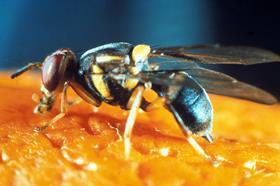
Millions of sterile Queensland fruit flies will be released over trial sites in two Australian states this week to protect crops from the damaging pest.
The flies will be released in western New South Wales (NSW) and northern Victoria, marking the first time the country’s A$60m (US$40m) SITPlus programme, has moved into the two states for full trials.
This follows successful releases of the sterile flies in South Australia over the past year.
Macquarie University is leading the pilot release effort. Professor Phil Taylor, from the university’s ARC Centre for Fruit Fly Biosecurity Innovation, said the flies will be released over urban areas in Cobram, Victoria and Hillston, NSW
This includes 1,000ha of citrus, cherry and summerfruit trees surrounding Hillston township from 11 and 12 September respectively.
“At each location, about 2m sterile flies will be released from a customised aircraft each week until April 2020,” Taylor said.
“On the ground, scientists will monitor the movement of the flies, their longevity in the field, the impact on crops and the wild population.”
Dan Ryan, Hort Innovation SITPlus director, said Queensland fruit flies are responsible for an estimated A$300m (US$205m) in lost produce and markets nationally, and the SITPlus initiative is working to turn that around.
“The sterile Queensland fruit fly production facility in Port Augusta is in full swing, producing 20m flies per week,” Ryan said.
“Satellite rear-out centres, which receive sterile flies from pupae stage and grow them for release, are also now open in Yanco, NSW and Tatura, Victoria. The programme is constantly being refined to ensure the best possible outcomes.”
The Australian fresh produce industry’s commitment to biosecurity was also highlighted by a report released by the Australian government on 10 September proposing a levy on containers.
The report has widespread support in the industry with many major importers and logistics operators contributing.
Bridget McKenzie, the Australianminister for agriculture, said supporting the country’s biosecurity system was vital.
“We have a passenger movement charge in place to help meet the cost of screening and inspecting people as they arrive,” McKenzie said.
“This industry report is a critical piece of the puzzle and the government will respond in due course.”



